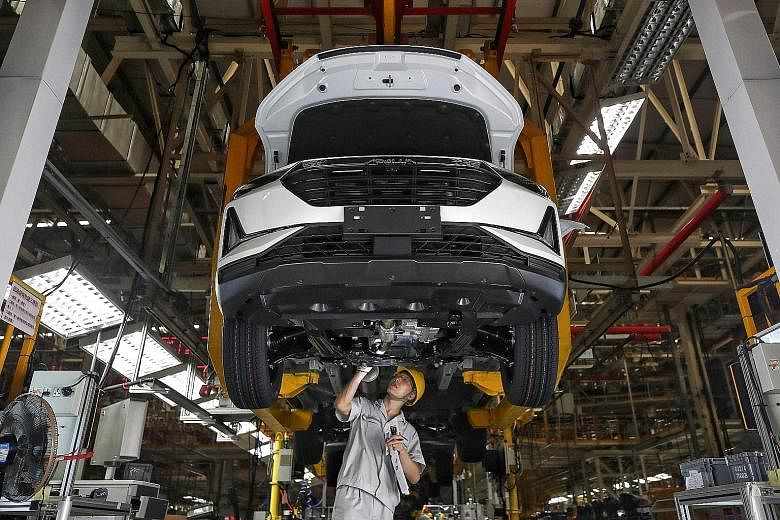BEIJING • China's industrial output last month accelerated the most in eight months, while retail sales grew for the first time this year, suggesting the economic recovery is gathering pace as demand starts to improve more broadly from the coronavirus crisis.
An annual decline in fixed-asset investment over January to last month also moderated, owing to government stimulus efforts, but the authorities remain wary about the outlook, given heightened external risks, including from intensifying United States-China tensions.
After the pandemic paralysed huge swathes of the economy, China's recovery has been gaining momentum as pent-up demand, government stimulus and surprisingly resilient exports propel a rebound.
"We think that China's economic recovery is on a reasonably firm footing now and should continue through Q4 and into 2021, with solid investment growth, gradually recovering consumption momentum and resilient exports," said Mr Louis Kuijs of Oxford Economics.
Industrial output growth quickened to 5.6 per cent last month from a year earlier, the fastest gain in eight months, data from the National Statistics Bureau showed yesterday. Analysts polled by Reuters had expected a 5.1 per cent rise from 4.8 per cent in July.
Retail sales also rose 0.5 per cent year on year, snapping a seven-month downturn and beating analysts' forecasts for zero growth. In July, sales fell 1.1 per cent.
Consumer confidence has been picking up lately, from spending on cars and duty-free shopping. Auto sales rose 11.8 per cent last month from a year earlier, while sales of telecommunications products jumped 25.1 per cent year on year, the data showed.
The decline in fixed-asset investment fell 0.3 per cent over January to last month from the same period last year, compared with a forecast 0.4 per cent slide and a larger 1.6 per cent decline in the first seven months.
Private sector fixed-asset investment, which accounts for 60 per cent of total investment, fell 2.8 per cent in the period from January to last month, compared with a 5.7 per cent decline in the first seven months of the year.
Recent economic indicators, from trade to producer prices and factory activity, suggested a further pickup in the industrial sector and the broader economy.
Government stimulus has been a powerful domestic driver, and momentum has been supported by Beijing's largely successful efforts to get the virus under control.
"Fiscal and monetary policy stimulus should continue to support the recovery. But we expect the impact of policy stimulus to lose some punch with credit growth easing in Q4," Mr Kuijs said.
Data last week showed China's exports last month marking the strongest annual gain since March last year, as more of its trading partners eased coronavirus lockdowns. Factory gate prices also fell at their slowest annual pace in five months last month.
Some analysts fear that the recovery could stall, hurt by rising tensions between Washington and Beijing, which many expect could escalate ahead of the US presidential election in November.
China is also looking to reduce its reliance on overseas markets for its development as US hostility and the pandemic increase external risks that could hamper longer-term progress.
REUTERS

